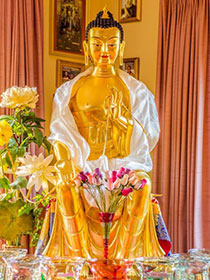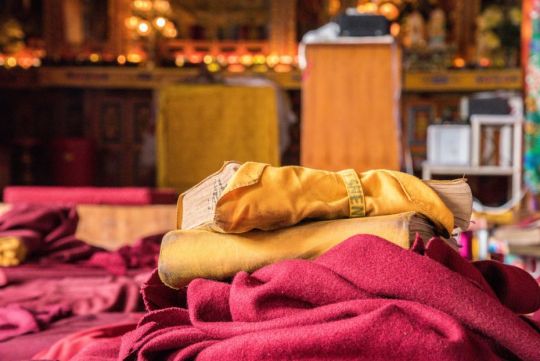- Home
- FPMT Homepage
Foundation for the Preservation of the Mahayana Tradition
The FPMT is an organization devoted to preserving and spreading Mahayana Buddhism worldwide by creating opportunities to listen, reflect, meditate, practice and actualize the unmistaken teachings of the Buddha and based on that experience spreading the Dharma to sentient beings. We provide integrated education through which people’s minds and hearts can be transformed into their highest potential for the benefit of others, inspired by an attitude of universal responsibility and service. We are committed to creating harmonious environments and helping all beings develop their full potential of infinite wisdom and compassion. Our organization is based on the Buddhist tradition of Lama Tsongkhapa of Tibet as taught to us by our founders Lama Thubten Yeshe and Lama Thubten Zopa Rinpoche.
- Willkommen
Die Stiftung zur Erhaltung der Mahayana Tradition (FPMT) ist eine Organisation, die sich weltweit für die Erhaltung und Verbreitung des Mahayana-Buddhismus einsetzt, indem sie Möglichkeiten schafft, den makellosen Lehren des Buddha zuzuhören, über sie zur reflektieren und zu meditieren und auf der Grundlage dieser Erfahrung das Dharma unter den Lebewesen zu verbreiten.
Wir bieten integrierte Schulungswege an, durch denen der Geist und das Herz der Menschen in ihr höchstes Potential verwandelt werden zum Wohl der anderen – inspiriert durch eine Haltung der universellen Verantwortung und dem Wunsch zu dienen. Wir haben uns verpflichtet, harmonische Umgebungen zu schaffen und allen Wesen zu helfen, ihr volles Potenzial unendlicher Weisheit und grenzenlosen Mitgefühls zu verwirklichen.
Unsere Organisation basiert auf der buddhistischen Tradition von Lama Tsongkhapa von Tibet, so wie sie uns von unseren Gründern Lama Thubten Yeshe und Lama Thubten Zopa Rinpoche gelehrt wird.
- Bienvenidos
La Fundación para la preservación de la tradición Mahayana (FPMT) es una organización que se dedica a preservar y difundir el budismo Mahayana en todo el mundo, creando oportunidades para escuchar, reflexionar, meditar, practicar y actualizar las enseñanzas inconfundibles de Buda y en base a esa experiencia difundir el Dharma a los seres.
Proporcionamos una educación integrada a través de la cual las mentes y los corazones de las personas se pueden transformar en su mayor potencial para el beneficio de los demás, inspirados por una actitud de responsabilidad y servicio universales. Estamos comprometidos a crear ambientes armoniosos y ayudar a todos los seres a desarrollar todo su potencial de infinita sabiduría y compasión.
Nuestra organización se basa en la tradición budista de Lama Tsongkhapa del Tíbet como nos lo enseñaron nuestros fundadores Lama Thubten Yeshe y Lama Zopa Rinpoche.
A continuación puede ver una lista de los centros y sus páginas web en su lengua preferida.
- Bienvenue
L’organisation de la FPMT a pour vocation la préservation et la diffusion du bouddhisme du mahayana dans le monde entier. Elle offre l’opportunité d’écouter, de réfléchir, de méditer, de pratiquer et de réaliser les enseignements excellents du Bouddha, pour ensuite transmettre le Dharma à tous les êtres. Nous proposons une formation intégrée grâce à laquelle le cœur et l’esprit de chacun peuvent accomplir leur potentiel le plus élevé pour le bien d’autrui, inspirés par le sens du service et une responsabilité universelle. Nous nous engageons à créer un environnement harmonieux et à aider tous les êtres à épanouir leur potentiel illimité de compassion et de sagesse. Notre organisation s’appuie sur la tradition guéloukpa de Lama Tsongkhapa du Tibet, telle qu’elle a été enseignée par nos fondateurs Lama Thoubtèn Yéshé et Lama Zopa Rinpoché.
Visitez le site de notre Editions Mahayana pour les traductions, conseils et nouvelles du Bureau international en français.
Voici une liste de centres et de leurs sites dans votre langue préférée
- Benvenuto
L’FPMT è un organizzazione il cui scopo è preservare e diffondere il Buddhismo Mahayana nel mondo, creando occasioni di ascolto, riflessione, meditazione e pratica dei perfetti insegnamenti del Buddha, al fine di attualizzare e diffondere il Dharma fra tutti gli esseri senzienti.
Offriamo un’educazione integrata, che può trasformare la mente e i cuori delle persone nel loro massimo potenziale, per il beneficio di tutti gli esseri, ispirati da un’attitudine di responsabilità universale e di servizio.
Il nostro obiettivo è quello di creare contesti armoniosi e aiutare tutti gli esseri a sviluppare in modo completo le proprie potenzialità di infinita saggezza e compassione.
La nostra organizzazione si basa sulla tradizione buddhista di Lama Tsongkhapa del Tibet, così come ci è stata insegnata dai nostri fondatori Lama Thubten Yeshe e Lama Zopa Rinpoche.
Di seguito potete trovare un elenco dei centri e dei loro siti nella lingua da voi prescelta.
- 欢迎 / 歡迎
简体中文
“护持大乘法脉基金会”( 英文简称:FPMT。全名:Foundation for the Preservation of the Mahayana Tradition) 是一个致力于护持和弘扬大乘佛法的国际佛教组织。我们提供听闻,思维,禅修,修行和实证佛陀无误教法的机会,以便让一切众生都能够享受佛法的指引和滋润。
我们全力创造和谐融洽的环境, 为人们提供解行并重的完整佛法教育,以便启发内在的环宇悲心及责任心,并开发内心所蕴藏的巨大潜能 — 无限的智慧与悲心 — 以便利益和服务一切有情。
FPMT的创办人是图腾耶喜喇嘛和喇嘛梭巴仁波切。我们所修习的是由两位上师所教导的,西藏喀巴大师的佛法传承。
繁體中文
護持大乘法脈基金會”( 英文簡稱:FPMT。全名:Found
ation for the Preservation of the Mahayana Tradition ) 是一個致力於護持和弘揚大乘佛法的國際佛教組織。我們提供聽聞, 思維,禪修,修行和實證佛陀無誤教法的機會,以便讓一切眾生都能 夠享受佛法的指引和滋潤。 我們全力創造和諧融洽的環境,
為人們提供解行並重的完整佛法教育,以便啟發內在的環宇悲心及責 任心,並開發內心所蘊藏的巨大潛能 — 無限的智慧與悲心 – – 以便利益和服務一切有情。 FPMT的創辦人是圖騰耶喜喇嘛和喇嘛梭巴仁波切。
我們所修習的是由兩位上師所教導的,西藏喀巴大師的佛法傳承。 察看道场信息:
- FPMT Homepage
- News/Media
-
- Study & Practice
-
-
- About FPMT Education Services
- Latest News
- Programs
- New to Buddhism?
- Buddhist Mind Science: Activating Your Potential
- Heart Advice for Death and Dying
- Discovering Buddhism
- Living in the Path
- Exploring Buddhism
- FPMT Basic Program
- FPMT Masters Program
- FPMT In-Depth Meditation Training
- Maitripa College
- Lotsawa Rinchen Zangpo Translator Program
- Universal Education for Compassion & Wisdom
- Online Learning Center
-
- Prayers & Practice Materials
- Overview of Prayers & Practices
- Full Catalogue of Prayers & Practice Materials
- Explore Popular Topics
- Benefiting Animals
- Chenrezig Resources
- Death & Dying Resources
- Lama Chopa (Guru Puja)
- Lama Zopa Rinpoche: Compendium of Precious Instructions
- Lama Zopa Rinpoche: Life Practice Advice
- Lama Zopa Rinpoche Practice Series
- Lamrim Resources
- Mantras
- Prayer Book Updates
- Purification Practices
- Sutras
- Thought Transformation (Lojong)
- Audio Materials
- Dharma Dates - Tibetan Calendar
- Translation Services
- Publishing Services
- Ways to Offer Support
- Prayers & Practice Materials
-
- Teachings and Advice
- Find Teachings and Advice
- Lama Zopa Rinpoche Advice Page
- Lama Zopa Rinpoche: Compendium of Precious Instructions
- Lama Zopa Rinpoche Video Teachings
- ༧སྐྱབས་རྗེ་བཟོད་པ་རིན་པོ་ཆེ་མཆོག་ནས་སྩལ་བའི་བཀའ་སློབ་བརྙན་འཕྲིན།
- Podcasts
- Lama Yeshe Wisdom Archive
- Buddhism FAQ
- Dharma for Young People
- Resources on Holy Objects
- Teachings and Advice
-
-
*If a menu item has a submenu clicking once will expand the menu clicking twice will open the page.
-
-
- Centers
-
- Teachers
-
- Projects
-
-
-
-
*If a menu item has a submenu clicking once will expand the menu clicking twice will open the page.
-
-
- FPMT
-
-
-
-
-
I encourage people not to express their anger, not to let it out. Instead, I have people try to understand why they get angry, what causes it and how it arises. When you realize these things, instead of manifesting externally, your anger digests itself. In the West, some people believe that you get rid of your anger by expressing it, that you finish it by letting it out. Actually, in this case what happens is that you leave an imprint in your mind to get angry again.
Share
Lama Thubten Yeshe
-
-
-
- Shop
-
-
-
The Foundation Store is FPMT’s online shop and features a vast selection of Buddhist study and practice materials written or recommended by our lineage gurus. These items include homestudy programs, prayers and practices in PDF or eBook format, materials for children, and other resources to support practitioners.
Items displayed in the shop are made available for Dharma practice and educational purposes, and never for the purpose of profiting from their sale. Please read FPMT Foundation Store Policy Regarding Dharma Items for more information.
-
-
2
Showing Respect to Holy Objects
Holy objects and Dharma materials represent and contain the teachings of the Buddha and thus protect against lower rebirth and reveal the path to enlightenment. Therefore, they should be treated with respect. Below is advice taken from Lama Zopa Rinpoche’s teachings about how to treat holy objects and Dharma materials in various contexts.
Showing Respect to Dharma Images and Texts
Dharma images, which include images of holy beings, deities, and other holy objects—such as temples, stupas, and prayer wheels, which all represent the Three Rare Sublime Ones—and Dharma texts, which contain the teachings of the Buddha, and include phones, tablets, laptops, and hard drives containing Dharma, should not be stepped over or put in places where students’ feet or buttocks will point at them. They should not be put on the floor or on a bed without a cloth underneath. They should be covered or protected for transporting and kept in a high, clean place separate from more mundane materials. Other objects, including statues, stupas, ritual implements, malas, reading glasses, and so forth, should not be placed on top of Dharma books and devices containing Dharma materials. Avoid licking the fingers to turn the pages of Dharma texts.

Morgan Finnell’s “smile” slogan tattoo, Vermont, United States, July 2018. Photo courtesy of Carina Rumrill.
Tattoos
It is best not to get tattoos of holy beings, deities, holy objects, mantras, sacred syllables, or Dharma words or quotations in Tibetan or any other language because it is easy to lay on top of them, take them into the restroom, and get them dirty.
Instead, if a student wants to get an inspiring tattoo, then it is better to get a tattoo of a meaningful slogan or saying that people can read and understand, as this will have more impact and the tattooed student won’t create the negative karma of being disrespectful to the Dharma. These slogans and sayings should not be Dharma quotes or teachings taken from sutras, tantras, or commentaries.
If a student already has a Dharma-related tattoo, the student should not cover up the tattoo with another tattoo, which is considered disrespectful. Students should simply do their best to treat the tattoo with respect.
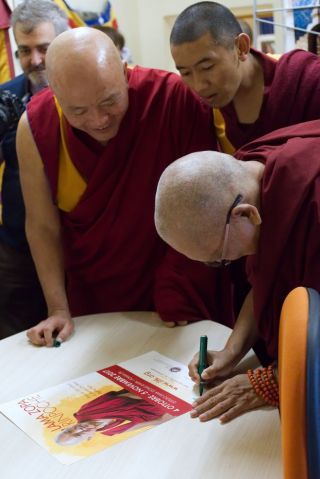
Lama Zopa Rinpoche signing a poster for Geshe Tenzin Tenphel, Istituto Lama Tzong Khapa, Pomaia, Italy, October 2017. Photo by Ven. Lobsang Sherab.
T-Shirts, Bags, Mugs, and Other Souvenirs
It is best to avoid printing holy beings, deities, holy objects, mantras, sacred syllables, or Dharma words or quotations in Tibetan or any other languages on t-shirts because students lie down on them, wear them into the restroom, wash them with dirty underwear, and do not regard these as representations of the Buddha or Dharma. It is also best to avoid having bags with similar designs on them as students often put them on the floor. Similarly, it is best to avoid having mugs with similar designs as people put them in their mouths and store them with mundane objects.
If a student treats a t-shirt with respect and doesn’t lie down on it or wash it with other clothes, Lama Zopa Rinpoche says it is OK to have a holy image or word, such “Buddha,” on a t-shirt.
Students can print slogans on t-shirts and souvenirs that make people think about Dharma but should avoid using Dharma images and words. Instead, students could consider having images of non-religious objects, for example, a smiley face.
In general, logos are OK. However, if the center logo contains a vajra, for example, that is considered a tantric implement and a holy object. The eight auspicious signs should also be treated with respect as Dharma and should not be embroidered on cushions to sit on, for example, or painted on the ground for when a lama arrives at a center.
The names, signatures, and hand writing of Lama Yeshe and other gurus are considered Dharma and should be treated with respect.
Distributing Holy Objects
Holy objects, such as prayer wheels, Dharma books, statues, images of gurus and deities, mantra rolls to go inside prayer wheels, double dorje brocade for thrones, stupas, and dorje and bell sets, should never be produced and distributed with a mind believing they are being “sold.” However, it is OK for one to collect money to cover the costs of materials and the time spent creating and distributing these holy objects.
Promotional Materials
It is OK to have holy images on posters and brochures as their purpose is to attract people to Dharma teachings. Moreover, these materials are usually placed up high and are not posted in the restroom or placed on the floor. When using Dharma images in promotional materials, it is best to not crop the image in such a way that the head or body of the holy being or deity is cut off.
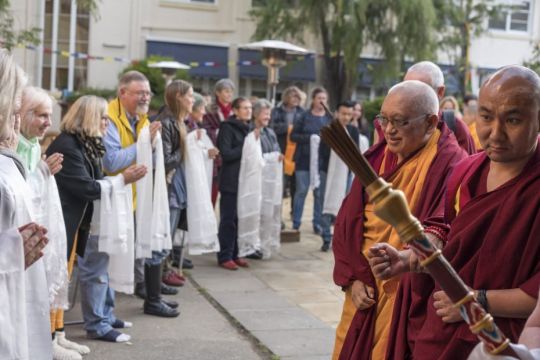
Lama Zopa Rinpoche arriving to teach, Hobart, Tasmania, Australia, May 2018. Photo by Ven. Lobsang Sherab.
Special Considerations for Khatas and Prayer Flags
Khatas, because they often have Dharma words, mantras, and the eight auspicious symbols woven into them, and prayer flags, should be treated with the same respect as other holy objects. It is best not to put khatas featuring Dharma words, mantras, etc. on the table in front of the teacher as this is where tea cups, clocks, and texts are placed. Using khatas without Dharma images and words on them is ideal.
Disposing of Holy Objects
Lama Zopa Rinpoche quotes Lama Tsongkhapa as saying that disposing of holy objects can easily become “giving up the Dharma” and disrespectful if one isn’t very careful with one’s thinking.
If it is necessary to dispose of printed Dharma materials, they should be burned rather than thrown in the trash or recycled. When burning Dharma texts, visualize that the letters transform into an A and the A absorbs into one’s heart. Imagine burning blank paper. As the paper burns, recite OṂ ĀḤ HŪṂ or the Heart Sutra, while meditating on emptiness.
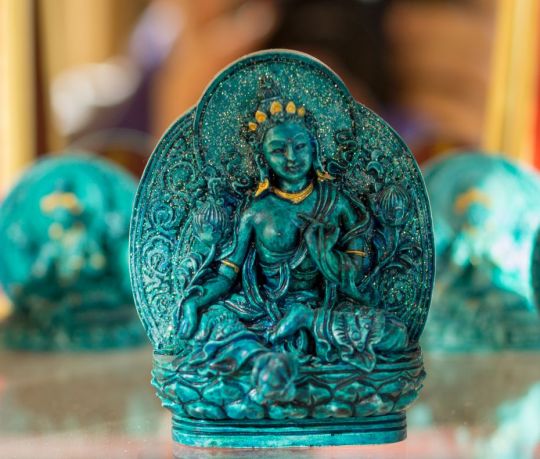
Green Tara tsa-tsa, Nalanda Monastery, Rouzegas, Labastide-Saint-Georges, France, March 2018. Photo by Harald Weichhart.
Lama Zopa Rinpoche recommends that images of holy beings, deities, and holy objects, even on khatas and prayer flags, not be burned. Ideally, if undamaged, they should be put in a stupa. If damaged, they should never go into stupas as doing so affects the minds of people who circumambulate them. Instead, put them high up in a tree inside a well-sealed structure, something like a bird house, so that the images are protected from the weather and do not end up on the ground.
Undamaged CDs, video cassettes, DVDs, etc. containing Dharma images and texts can placed in stupas. Do not put damaged or broken holy objects, such as tsa-tsas, inside stupas or statues. Instead, repair the holy objects, or, put unrepairable holy objects into tsa-tsa houses. Ensure that the objects are stored in such a way that they do not get dirty.
Through comprehensive study programs, practice materials, and training seminars, FPMT Education nourishes the development of compassion, wisdom, kindness, and true happiness in individuals of all ages.
- Tagged: holy object, holy objects, khata, prayer flags, tattoos
- Home
- News/Media
- Study & Practice
- About FPMT Education Services
- Latest News
- Programs
- New to Buddhism?
- Buddhist Mind Science: Activating Your Potential
- Heart Advice for Death and Dying
- Discovering Buddhism
- Living in the Path
- Exploring Buddhism
- FPMT Basic Program
- FPMT Masters Program
- FPMT In-Depth Meditation Training
- Maitripa College
- Lotsawa Rinchen Zangpo Translator Program
- Universal Education for Compassion & Wisdom
- Online Learning Center
- Prayers & Practice Materials
- Overview of Prayers & Practices
- Full Catalogue of Prayers & Practice Materials
- Explore Popular Topics
- Benefiting Animals
- Chenrezig Resources
- Death & Dying Resources
- Lama Chopa (Guru Puja)
- Lama Zopa Rinpoche: Compendium of Precious Instructions
- Lama Zopa Rinpoche: Life Practice Advice
- Lama Zopa Rinpoche Practice Series
- Lamrim Resources
- Mantras
- Prayer Book Updates
- Purification Practices
- Sutras
- Thought Transformation (Lojong)
- Audio Materials
- Dharma Dates – Tibetan Calendar
- Translation Services
- Publishing Services
- Teachings and Advice
- Find Teachings and Advice
- Lama Zopa Rinpoche Advice Page
- Lama Zopa Rinpoche: Compendium of Precious Instructions
- Lama Zopa Rinpoche Video Teachings
- ༧སྐྱབས་རྗེ་བཟོད་པ་རིན་པོ་ཆེ་མཆོག་ནས་སྩལ་བའི་བཀའ་སློབ་བརྙན་འཕྲིན།
- Podcasts
- Lama Yeshe Wisdom Archive
- Buddhism FAQ
- Dharma for Young People
- Resources on Holy Objects
- Ways to Offer Support
- Centers
- Affiliates Area
- Teachers
- Projects
- Charitable Projects
- Make a Donation
- Applying for Grants
- News about Projects
- Other Projects within FPMT
- Support International Office
- Projects Photo Galleries
- Give Where Most Needed
- FPMT
- Shop
Translate*
*powered by Google TranslateTranslation of pages on fpmt.org is performed by Google Translate, a third party service which FPMT has no control over. The service provides automated computer translations that are only an approximation of the websites' original content. The translations should not be considered exact and only used as a rough guide.It is necessary to help others, not only in our prayers, but in our daily lives. If we find we cannot help others, the least we can do is to not harm them.







